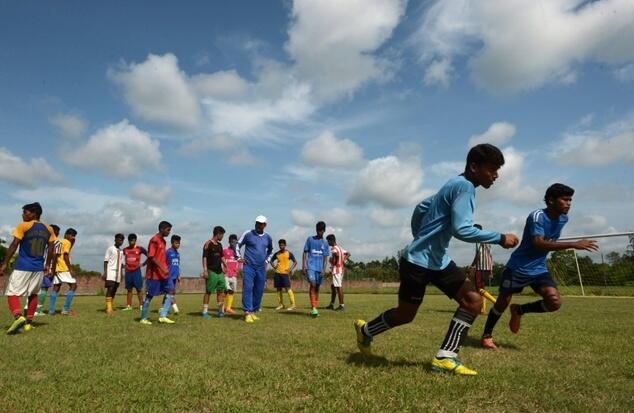In a break from training for one of the world’s largest football tournaments, Yakub Ali swells with pride at the idea of putting a smile on the face of his mother back in Asia’s biggest red light district.
“We’ve grown used to people sneering about where we come from and telling us that our mothers are worthless,” says 15-year-old Yakub.
“So this will be a gift to all of our mothers who have to put up with discrimination, abuse and injustice every day of their life in Sonagachi.”
Yakub is one of eight sons of sex workers living in Kolkata’s notorious Sonagachi neighbourhood who are heading to Denmark later this month to take part in the Dana Cup, an international youth tournament.
His Durbar Sports Academy teammates also include youngsters drawn from other slum areas in India’s eastern metropolis. They will join hundreds of teams taking part in the tournament which runs from July 26-30.
The tournament in the northern town of Hjorring will include teams of boys and girls from every corner of the globe but few will surely match the raw desire to prove their worth than the Durbar line-up.
The academy is overseen by the Durbar Mahila Samanwaya Committee (DMSC), a charity organisation which works for the welfare of Indian prostitutes and also runs Asia’s first cooperative for sex workers.
Situated around 40 kilometers (25 miles) south of Kolkata, the academy gives underprivileged youngsters an opportunity to let their hair down far away from the narrow alleys and squalid apartments of Sonagachi.
An estimated 8,000 sex workers ply their trade in Sonagachi which is home to several hundred brothels, gaining it the reputation as the largest single red light zone in Asia.
Smarajit Jena, a public health scientist who founded DMSC, said the boys were routinely treated as pariahs in Sonagachi and often found themselves with no one to turn to when they encounter challenges in their daily life.
– Treated as untouchables –
“The kind of loneliness that the children of sex workers have to endure is hard to describe. They are treated as untouchables,” Jena told AFP.
“Most of them end up dropping out of school because of the stigma so we need something to focus on and bring them back into the mainstream.”
Yakub, a wiry centre-forward, said he had “cried tears of joy” when the team managed to qualify for Denmark. The cost of the trip is being underwritten by several Indian and international corporations.
“Football has opened doors for boys like us to prove our worth,” the teenager said.
“We got a taste for victory when we won our league in Kolkata last year but now we are only looking forward.”
Yakub says he never goes anywhere without a picture of his hero Lionel Messi in his pocket, but acknowledges that he will have to temper his inclination to go on mazy runs like his Argentine hero.
“We are training hard and trying to stay focused.. We are being trained to perform like a finely-tuned orchestra rather than as a solo act,” he explains.
While cricket is the number sport in India, Kolkata is often regarded as the premier football city and it is just as common to see youngsters kicking a ball on the streets as wielding a bat.
The coach of the academy, Biswajit Majumdar, said the boys’ determination to triumph against the odds made them a joy to work with on the training field.
“It’s wonderful that the boys dare to dream,” Majumdar told AFP.
“They are often treated badly and have to put up with nasty comments but they have a never-say-die attitude and hunger for success, which you can’t help but be inspired by.”
Majumdar said that his charges would have to make sacrifices to maintain their focus while in Denmark and ensure that they do themselves proud.
“We have taken away their cell phones to minimise any distractions,” he said.
“My task is to make use of that fire in their belly, so they push themselves even harder in training and so they can achieve their goals.”
Source: AFP











